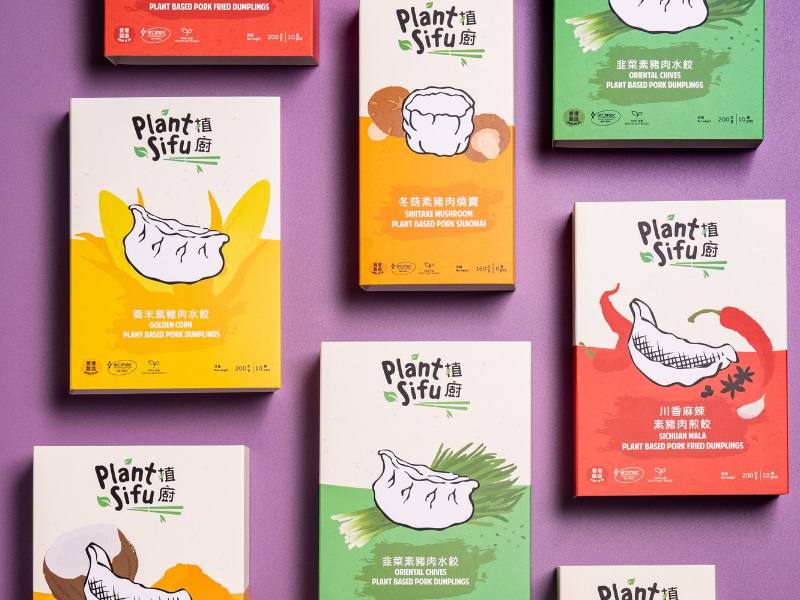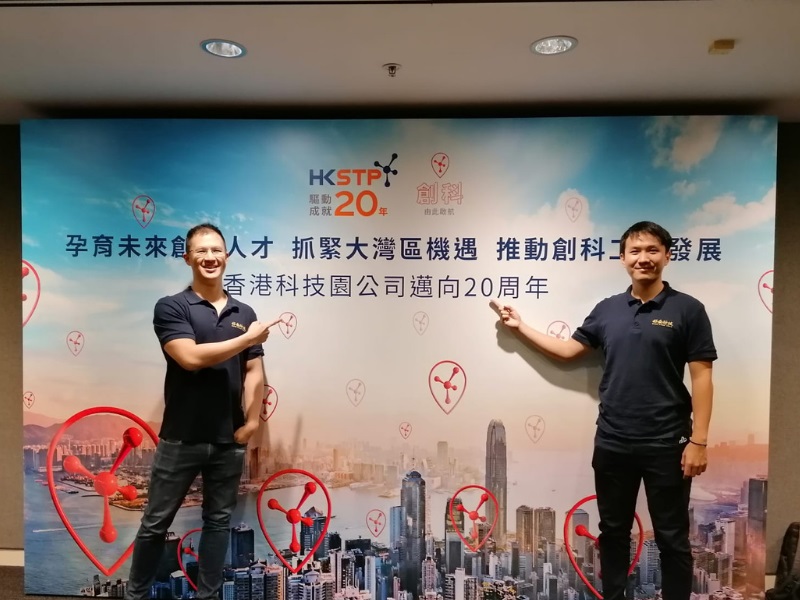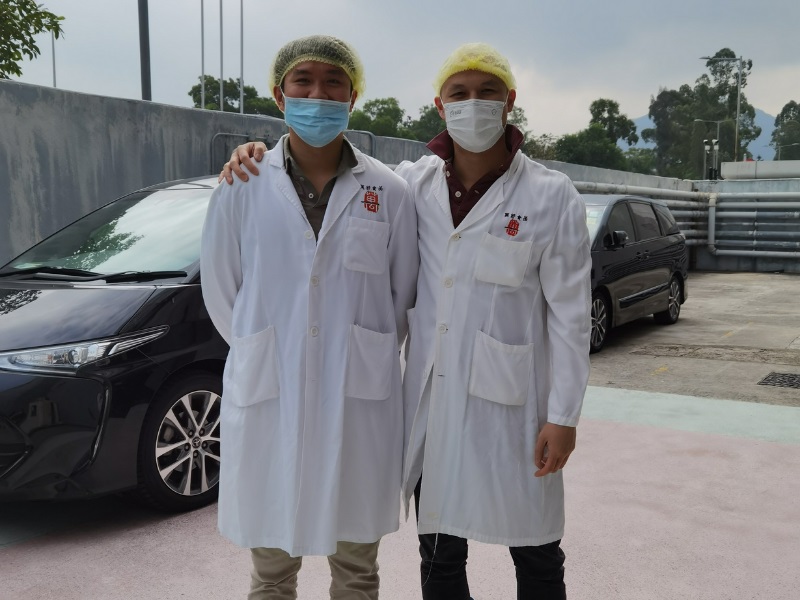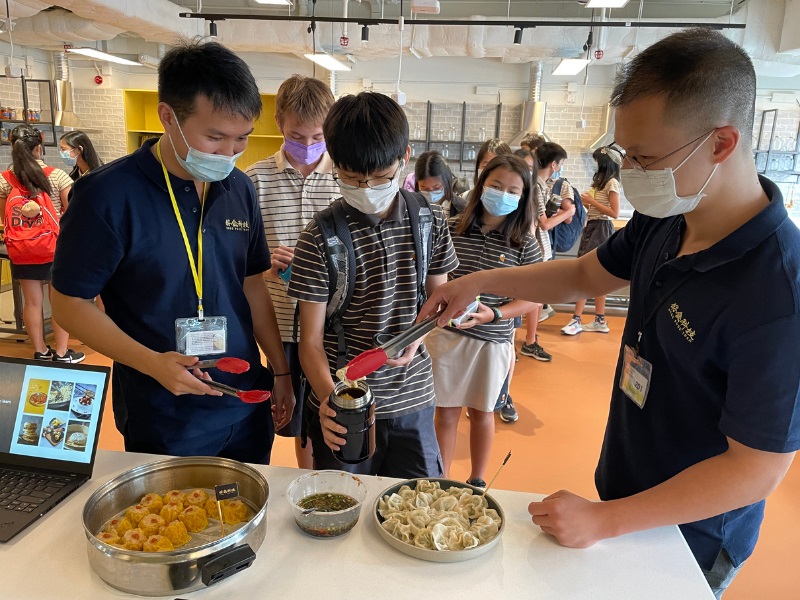MEMBER SPOTLIGHT – GOOD FOOD TECHNOLOGIES

By Jade Chen
14 mins reading time
Armed with a love of food, a passion for entrepreneurship and an eagerness to see change in the food industry, self-described “long time foodies” Andrew Leung and Joshua Ng are forging the path for a more sustainable Asian food future. Following its launch in 2020, their Hong Kong based startup Good Food Technologies has been reimagining Asian cuisine, bringing to the market a plant-based protein alternative that is tailored to Asian applications and palates.
Since its initial launch, the company has blossomed quickly, finding its feet in Hong Kong’s bustling F&B scene to make waves in the industry. By harnessing the synergy between food and technology, the duo aspires to “feed the world by creating tasty, nutritious, affordable and innovative food products”.

Good Food Technologies’ Plant Sifu branded dim sum products
PORK FAT – WITH LESS FAT AND NO PORK
Back in 2020, Andrew and Joshua started off with a simple goal: to create tasty plant-based pork suited for Chinese applications. Whilst the choice of pork was a no-brainer (after all, it is the most commonly used type of meat in Asian cuisine), more research had to be done in order to narrow down the focus. In the midst of the pandemic, Andrew and Joshua decided to take advantage of their surroundings, speaking to numerous Chinese chefs in the search for clearer direction. The result of their investigation was the discovery of an unexpected core ingredient, an ingredient that made up the essence of Asian cuisine and contributed to the characteristic tastes and flavours of their favourite foods. The ingredient was fatty pork.
Fueled by this discovery, the duo set out to create Good Food Technologies’ first invention: Aromax. As the company’s core invention, this plant-based alternative possesses all the trademarks of fatty pork, forming the building blocks for the company’s other products. With superior texture, great taste, an enhanced aromatic profile and a visually akin exterior, it’s hard to tell the product apart from the original.
Harnessing this technology, Good Food Technologies then developed two pork products: pork mince and ground pork. The lean part of the pork is made using non-GMO soy, whilst the fatty component consists of konjac, coconut oil and natural flavours. As Andrew proudly explains, the company’s Aromax technology drops the fat content by 90% and the protein content, which stands at around 17% in the minced pork matches that of normal pork. Moreover, Andrew notes that the products do not contain cholesterol, antibiotics, or hormones, making them, in some ways, superior to pork.

Andrew and Joshua at the Hong Kong Science and Technology Parks Corporation
SEEDS PLANTED EARLY
Awareness towards sustainability started early for both Andrew and Joshua. For Joshua, his passion for sustainability began during his university days, where he worked on renewable energy powered aircraft and race cars. He then embarked on a global consulting career, where one of the projects involved investigating future food technologies for a smart city in Saudi Arabia. There, he developed a deep understanding of today’s food ecosystem. As he learned about the resources required to sustain today and feed future generations, it became apparent that we need new approaches to produce what we eat today. Diving into emerging technologies, he became fascinated by the possibility of alternative proteins. The unique combination of food and sustainability made the topic that much more interesting, and soon he became a keen alternative protein believer.
As for Andrew, he has incorporated sustainability to be a part of his lifestyle. During his PhD, he focused on recycling waste materials, turning waste into pharmaceutical compounds. Later on, he began to adopt a greener lifestyle, going from vegetarian to vegan. He tells me that “sustainability is a lifestyle. It’s more than just food, it’s more than just travelling — it encompasses all your daily activities”. He notes that food has always been interesting to him. “We spend two hours a day eating, and even more time preparing food. There’s a huge change that needs to be made and alternative protein is one of the most impactful ways to change”.
THE JOURNEY TO GREENER PASTURES
From developing the initial product to launching and promoting it, no step on Andrew and Joshua’s entrepreneurial journey has been easy; but that’s what makes it so rewarding. Wistfully, Andrew recalls the beginning of his journey, telling me how the company has gotten to where it is today.
“Back in the day we had just a little lab and a test kitchen, and we were experimenting with everything: from raw materials to proteins to binders. Just changing one of these factors by 1% would change everything, the texture, the flavour, it would all fall apart. And after months of R & D, when we finally got to a satisfactory product, we still had to tackle the application aspect, the dumplings and the dim sum. So we tasted almost ten steamers of shaomai in one day. We also had a xiao long bao testing with over 100 tables in a little restaurant to hear customers’ feedback. This was really encouraging when we were mid-development”.

Joshua (left) and Andrew (right) at their Hong Kong production site
In addition to its core line of pork products, Good Food Technologies also offers a line of delectable dim sum products under the brand Plant Sifu, putting a unique spin onto some much loved Hong Kong classics. Whether it be plant-based shaomai or chive dumplings, their products have been well-received, making appearances in 7-Eleven, IKEA, Maxim’s, Ocean Park and more.
GETTING ON THE BANDWAGON
Introducing the product to a city of hardcore food enthusiasts is no easy undertaking. As Andrew explains, the “foodie paradise” that is Hong Kong comprises a plethora of palates and preferences that is often hard to cater to. “Finding the balance even between savoury and sweet is a challenge, as Cantonese people and Chinese people already have significantly different taste preferences”. Andrew explains that “when we first started out, Joshua and I had these intense flavour testing trials where we would taste samples from a grid of thirty different steamed patties with different ingredients”. Then, he says, they had to expand, reaching public and professional taste buds in order to find the right taste profile.
Joshua cites partnerships with Chinese restaurants and chefs as one of the key ingredients to their success so far. He tells me that Good Food Technologies’ partners in the restaurant industry have helped tremendously with the testing, adaptation and application of products, helping the company perfect and launch its products. “We do speak to many professional chefs, and a lot of the time it’s their instinct that gives us the best feedback,” says Andrew.
TASTE IT TO BELIEVE IT
Selling a food product makes outreach and promotion challenging since, as Joshua notes candidly, “people need to be able to try your products in order to spread the word”. As there aren’t really any shortcuts when it comes to marketing, the duo invites chefs to taste their dishes, developing connections organically to reach a wide customer base. To further broaden its range of audiences, the company also works with schools, recently delivering a demonstration and tasting experience to graduate students at the University of Hong Kong (HKU). The company has also worked with ESF schools, giving students presentations and a hands-on opportunity to make dumplings using plant-based meat. Andrew explains that the experience gives students “a sense that plant-based meat isn’t that scary. You can cook it and handle it just like meat— in fact, it’s cleaner and doesn’t have the usual, unpleasant scent of meat”.

Joshua (left) and Andrew (right) conducting a plant-based dim sum tasting with ESF students
Consumer feedback has been mixed, but encouraging nevertheless. There are two ends to the spectrum, explains Joshua, with younger customers and quick retail approaches on one end and more traditional dim sum restaurants with old-school chefs and customers on the other. Whilst the first group of consumers is generally eager to try something new, the second group of consumers is used to ordinary meat, finding it hard to imagine an alternative. In these cases, pushing customers to try the product, or even getting the chef to experiment with it, can be quite challenging.
The plant-based trend in Hong Kong seems also to be youth-driven, and Andrew observes that they often encounter children browsing through their products in retail stores. He notes that the younger generation is often driving the decision to eat plant-based: “they know about it, they hear about it and they are the biggest, strongest believers in this movement”.
On occasion, some customers (especially the older generations) are unable to eat meat for health reasons, and have to adopt vegetarian diets. In such situations, presenting an equally-tasty alternative that reminds customers of actual meat creates a sense of satisfaction. Not long ago, the duo also visited an elderly home in Pokfulam, where they introduced their product to an unexpected consumer base of 70 to 80 year olds. The feedback was surprisingly positive, with elderly customers remarking how astonished they were that the products were plant-based. “It’s one bite at a time”, says Joshua, noticing how there’s both a good and a bad side to this strategy. “On one hand, the reaction is super fast as there’s no delay and you get feedback immediately. On the other hand, you can’t really get consumer feedback unless you have the product cooked and ready to taste”.
THE INGREDIENTS OF SUCCESS
Presentation can get the customer’s attention, but at the end of the day it’s taste that keeps them coming back for more. Joshua explains how the company is trying to create more innovative dim sum: “so rather than just a char siu bao, we would want to make a pandan flavoured bao, for example, with a green exterior so people have extra motivation to pick it up and try it”. But Joshua also notes that “the baseline is that food needs to be tasty. I think it’s often overlooked in plant-based food because they think that health and animal welfare justifies giving up taste, but that’s not the case”.
In addition to producing 89% less emissions, using 84% less water and taking up 50% less land than ordinary pork, Good Food Technologies’ pork products have also achieved price-parity with its meat counterparts. Sometimes, Andrew shares, chefs actually appreciate the plant-based nature of their product— not just from the environmental angle but also from a hygienic standpoint. “Using plant-based meat means chefs are getting less exposure to animal products, which they know have more bacteria (such as E. Coli and salmonella). Our pork also comes readily-minced or ground, making the product ready to use once it’s defrosted. Chefs just throw it straight into the dish, and often they are surprised how applicable the product is. They don’t need to change recipes or modify techniques at all, they just treat it exactly like meat”.
When asked about his proudest moment, he comments that he hasn’t had one yet. Instead, what Joshua enjoys most about his entrepreneurial journey is the mini wins he gets to experience each day. As an example, the company works with a restaurant where they have a tasting menu to introduce customers to their products. Initially, people are usually sceptical, yet their attitudes transform drastically upon tasting the product. “In an hour, we see people go from sceptical to ‘hey, I have to bring this to my chef or my team’ is such a satisfying moment”.

Joshua speaking at Future Green May Monthly Meet-up: Value Natural Resources
WHERE MEAT MEETS THE FUTURE
Andrew and Joshua continue to spearhead the plant-based movement in Asian cuisine, and already have ambitious plans for the future. In March this year, the duo experienced an encouraging win, bagging an HK$12 million seed round. “We still have a long way to go,” says Joshua. “What we’re doing has implications that go way beyond Hong Kong, adoption way beyond Hong Kong. This journey of building something from nothing is exciting and knowing that we’re delivering impact with each bite is motivating”. “Our vision is to be present in not only Hong Kong but also Greater China and other developed markets. We aspire to become a leader in plant-based meat for Chinese and Asian cuisines. I think that’s when the satisfaction will seep in.”
In the immediate future, Andrew and Joshua hope to cement their position as the number one player for plant-based food in Chinese cuisines. Next up, they hope to establish that image in the Greater Bay area and certain key cities in China as well, expanding geographically to broaden the company’s reach.
They also want to expand their line of products to include more different forms and types of proteins. “I don’t want to reveal too much, but that’s something we want to look into. It could be seafood, it could be other types of proteins, so keep an eye out!”.
As one of Future Green members, Good Food Technologies has been to several meetups, meeting other key players in the industry that are working towards the same cause. “Getting the chance to meet new friends who are also in the plant-based industry is really worthwhile. We’re also working on exciting projects with the Future Green Team, and are really looking forward to the impact that can bring”.
To learn more about Good Food Technologies head to their website here.
If you make sustainable products suitable for foodservice please get in touch about Future Green Membership and lets see what possibilities lie ahead in normalising sustainability!
Interested in more?
2024
We’re Hiring – Marketing Interns Needed!
2024
Reflections from the Future Green Unconference 2.0: A Journey Towards Sustainable Food Systems
2024
SOURCING SEAFOOD RESPONSIBLY IS THE TOPIC OF OUR APRIL 2024 MEMBERS MONTHLY MEETUP
2024
REDUCE, REUSE, AND RECYCLE IS THE TOPIC OF OUR MARCH 2024 MEMBERS MONTHLY MEETUP
2024
PLANT-FORWARD, LESS, AND BETTER MEAT IS THE TOPIC OF OUR FEBRUARY 2024 MEMBERS MONTHLY MEETUP
2024
Marketing Coordinator
2024
The Recycling Crisis: Why Hong Kong Must Prioritise Reducing over Recycling
2024